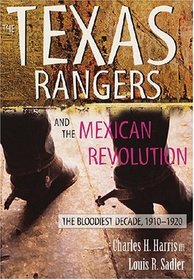Search -
The Texas Rangers and the Mexican Revolution: The Bloodiest Decade, 1910-1920
The Texas Rangers and the Mexican Revolution The Bloodiest Decade 1910-1920
Author:
The decade 1910-1920 was the bloodiest in the controversial history of one of the most famous law enforcement agencies in the world--the Texas Rangers. Much of the bloodshed was along the thousand-mile Texas/Mexico border because these were the years of the Mexican Revolution. Charles Harris III and Louis Sadler shed new light on this turbulent ... more »
Author:
The decade 1910-1920 was the bloodiest in the controversial history of one of the most famous law enforcement agencies in the world--the Texas Rangers. Much of the bloodshed was along the thousand-mile Texas/Mexico border because these were the years of the Mexican Revolution. Charles Harris III and Louis Sadler shed new light on this turbulent ... more »
ISBN-13: 9780826334848
ISBN-10: 0826334849
Publication Date: 3/16/2007
Pages: 687
Rating: ?
ISBN-10: 0826334849
Publication Date: 3/16/2007
Pages: 687
Rating: ?
0 stars, based on 0 rating
Publisher: University of New Mexico Press
Book Type: Paperback
Other Versions: Hardcover
Members Wishing: 0
Reviews: Amazon | Write a Review
Book Type: Paperback
Other Versions: Hardcover
Members Wishing: 0
Reviews: Amazon | Write a Review
Genres:
- History >> Americas >> Mexico
- History >> Americas >> General
- History >> Military >> General
- History >> Military >> United States >> General




